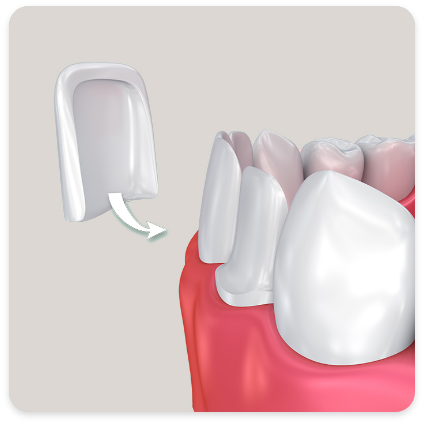What dental issues can porcelain veneers address?
Porcelain veneers are made to look like natural teeth. Although they’re often regarded as a cosmetic dental solution, they can also address a wide range of dental concerns, including the following:
- Worn teeth
- Crooked teeth
- Stained teeth
- Teeth that resist bleaching
- Misshapen teeth
- Misaligned teeth
- Gaps between teeth
What’s the procedure for getting veneers?
- You share your goals with your dentist during your initial consultation. Your dentist then examines your teeth and oral and medical histories to determine if veneers are the right dental solution for you.
- During your first visit, you may also need to have x-rays and impressions of your teeth taken.
- Your dentist prepares the tooth for the procedure. They file it down to make room for the veneer. The amount removed is almost the same as the size of the veneer.
- Next, impressions are taken and forwarded to the dental laboratory. You may be given temporary veneers to wear and protect the prepared area. It may take 2-4 weeks to fabricate your veneers.
- On this visit, you and your dentist also choose which shade to use for the veneer. Once your final veneers are completed, your dentist will fit them over your teeth to ensure that everything’s in order. Adjustments can be made to ensure you’re satisfied with your veneers.
- Afterward, your teeth are cleaned and polished. They’re also etched to ensure strong veneer adhesion. Your veneer is then coated with cement before it’s bonded to your tooth.
- The veneer is positioned on your tooth, and your dentist exposes it to a light beam to activate the special cement. Your veneer will then harden and adhere to the tooth.
- Once all the veneers are attached, your dentist removes any excess cement and evaluates your bite.
- You’re scheduled for a follow-up visit so your dentist can check the condition of your veneers.
Benefits of porcelain veneers
- Natural looking
- Makes your smile appear whiter
- Stain resistant
- Doesn’t need special maintenance
- Lasts for up to 10-15 years with proper care
What you need to know before getting dental veneers
- Veneers may not be for you if you’re grinding, clenching your teeth, biting your nails, or biting down on objects. Veneers are wafer-thin and may break or chip when exposed to pressure.
- Your teeth and gums must also be in great shape before receiving veneers. Your dental team will likely recommend addressing any dental issues first.
- The veneer procedure is irreversible.
- Veneers can loosen over time, and you might need a replacement when that happens.
- It may take some time for you to get used to your veneers. You may notice changes in your bite, but if the discomfort persists, let your dentist know. Your veneers may need to be adjusted.
- Cavities or decay can form around veneers. Maintaining good oral hygiene is crucial to making the most of them.
Learn more about dental veneers in Little Italy, Toronto, ON
Porcelain veneers offer a great way to enhance your smile. Before deciding to get them, study their pros and cons with your dental team. See if they match your unique needs and requirements.
We’re happy to answer your questions about boosting your oral health.







